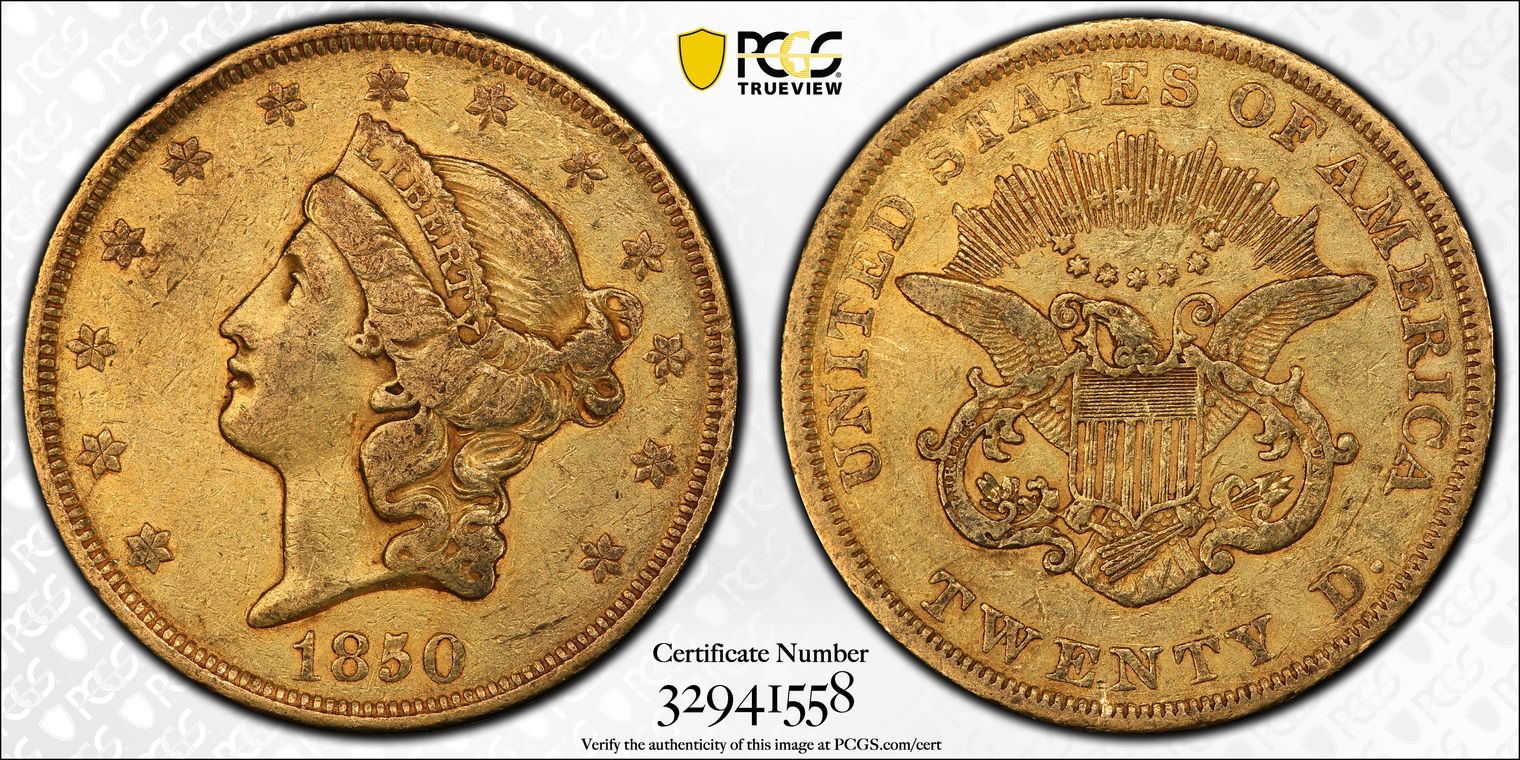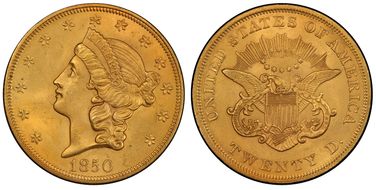1850 $20 XF40 认证号32941558, PCGS号8902
拥有者评论
专家评论
Doug Winter
The following information is from my eBook on Type One Liberty Head Double Eagles at http://doubleeaglebook.com/The 1850 double eagle is a very popular issue as it is the first collectible issue from this mint. It is reasonably available in lower grades (Very Fine and Extremely Fine) but it becomes harder to locate in the middle About Uncirculated range and it is scarce in properly graded AU58. This issue is very scarce and popular in Uncirculated and it is rare in MS62, very rare in MS63 and exceedingly rare above this.
STRIKE: New dies and extra care were employed to produce this issue, and as a result the 1850 is among the best-struck Type One double eagles. The obverse is usually seen with nearly full detail on the hair of Liberty, full radial lines in the stars, and sharply defined denticles. The reverse is also seen with a sharp strike and detail on the feathers, and at the border is often full or nearly so. The collector should be able to locate a coin with very good detail with little effort.
SURFACES: Many 1850 double eagles show fairly extensive abrasions on the surfaces. However, there are a fair number known with minimally abraded fields. I have seen some examples with raised die polishing marks in the fields. These are mint-made and should not be confused with hairlines, which are the result of cleaning. A clean, wholesome 1850 double eagle can be found with just a bit of patience.
LUSTER: This issue is seen with at least two distinct types of luster. The more common appearance is frosty with a slightly grainy texture. There are also pieces with semi-prooflike to nearly fully prooflike reflectiveness. These can be visually impressive but they are often heavily bagmarked and have poor eye appeal as a result. It is likely that these are the first struck from their die pair and these are numismatically significant as a result.
COLORATION: The natural coloration ranges from a rich green-gold hue to medium orange-gold. There are still a decent number of 1850 double eagles with natural color, but these are becoming harder to locate.
EYE APPEAL: The eye appeal for 1850 double eagles is generally above average by the standards of this series. This is due to the fact that many higher grade examples are very well struck, have good luster, and can show pleasing natural color(s). This is actually among the easier Type One issues to locate with really good eye appeal, and the patient collector should be able to locate a very pleasing 1850 in a variety of grade and price ranges.
INTERESTING VARIETIES: Varieties are known with a Closed 5 (where the knob of this digit touches the cusp), and an Open 5 (where the knob of this digit is free from the cusp). These are not generally collected and don’t command any price premium.
PROOFS: A very small number were struck but I have never personally seen one. I have been told by a knowledgeable American dealer that there is a Proof 1850 double eagle that he has seen in Paris and it is an unquestionable Proof. It is believed that at least one was struck for Engraver James B. Longacre, and that another may have been made for the Congressional Committee on the Library. A genuine Proof would be one of the most significant issues of this design.
HOARDS: There were a total of 53 in the S.S. Republic including two in Uncirculated. 26 were recovered from the S.S. Central America, all in circulated grades. 92 were found in the so-called “Baltimore Hoard.” Around ten years ago, I viewed (and then later sent to PCGS and NGC) a collector’s accumulation of 1850 double eagles ranging from VF to MS-61 which number over three dozen pieces.
BUYING TIPS: This historically significant date is very popular and it has collector appeal outside of the specialist community. Date collectors tend to look either for a nice mid-range AU or they splurge for an impressive Uncirculated example. Be patient and wait for a clean, well struck piece with nice color; these coins are still available and they do not command a huge price premium over a “typical” 1850.
AUCTION RECORD: The current auction record for this date was set in the 2007 FUN sale when Heritage 1/07: 3698, graded MS65 by NGC, realized $161,000. This smashed the previous record of $62,100, which was set by Bass III: 757 (Bowers and Merena 10/99), graded MS64 by PCGS.
FINEST KNOWN: There are some really outstanding 1850 double eagles known. The best that I have personally seen is an NGC MS65 which was last sold as Lot 3698 in the Heritage 1/07 sale (it realized $161,000). It is earlier ex Bowers and Merena 5/00 (Bass III): 757 ($62,100; as PCGS MS64) and it was obtained by Bass in the New Netherlands April 1972 auction. NGC shows a second coin graded MS65 in their population report but I am inclined to think it is the same piece.
RARITY:
TOTAL KNOWN: 2500-3500+
BY GRADE:
Very Fine: 750-1000
Extremely Fine: 1150-1500
About Uncirculated: 600-900
Uncirculated: 50-100
POPULATION FIGURES: As of the beginning of 2015, PCGS had graded 37 in MS62, two in MS62+, seven in MS63, and one in MS64 for a total of 77 in Uncirculated. NGC had graded 10 in MS63, one in MS64, one in MS64PL, and two in MS65 for a total of 78 in Uncirculated. These figures are much inflated by resubmissions, especially in the MS60 to MS62 range. CAC has approved five in MS61 and four in MS62, for a total of nine in Uncirculated.
PERFORMANCE SINCE 2002: Few common dates of this type have shown the price performance of the 1850 and this is attributable to its level of demand outside of specialists and date collectors. When the first edition of this book was written in 2002, a nice AU example could be purchased in the $2,500-3,500 range. Today, a nice AU costs at least $5,000-8,000.
COMMENTS: The 1850 remains one of my favorite Type One double eagles. It is a numismatically significant issue which is well made and available in relatively high grades. A few choice examples have surfaced since the first edition of this book (2002), and these are among the most attractive Liberty Head double eagles of this type.
David Akers (1975/88)
The 1850 is the first regularly issued Double Eagle. It is essentially identical in design to the pattern 1849 although the relief of the head, particularly Liberty's cheek, is slightly lower. Because of its first year status, the 1850 often brings rather higher prices than some other dates of this type that are actually more rare. In reality, the 1850 is one of the most common Type I Double Eagles and mint state examples, although quite rare, are seen more often than many overzealous cataloguers would lead one to believe. Nevertheless, VF and EF are by far the most often available grades. I have seen a fair number of choice and gem quality specimens and have seen several that I would call "superb." Most known 1850 Double Eagles are semi-prooflike but fully frosty and fully prooflike examples are also encountered.
稀有性和存量估计 了解更多
| 所有评级 | 3770 |
| 60或以上 | 70 |
| 65或以上 | 0 |
| 所有评级 | R-4.2 |
| 60或以上 | R-8.3 |
| 65或以上 | R-10.1 |
| 所有评级 | 37 / 44 TIE |
| 60或以上 | 30 / 44 TIE |
| 65或以上 | 1 / 44 |
| 所有评级 | 80 / 148 TIE |
| 60或以上 | 57 / 148 TIE |
| 65或以上 | 1 / 148 |























